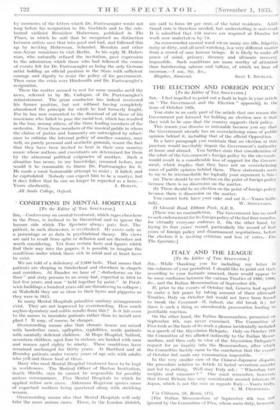THE ELECTION AND FOREIGN POLICY
[7'o the Editor of Tim SPEerxron.] feel impelled to point out a fault in logic in your article on " The Government and the EleCtion " appearink in the issue of October 18th.
• You state in an early part of the article that one reason the Government put forward for holding an .election now is that they wish to be sure that the country supports their policy.
This reason you dismiss as untenable because you say that the Government already has an overwhelming mass of public opinion behind it, including that of the official Opposition.
In a later paragraph you maintain that an election at this. juncture would inevitably impair the Government's authority at home and abroad. You further state that consideration of, the whole of the Government's foreign policy by the electorate would result in a considerable loss of support for the Govern; ment, which implies that they have not an overwhelming mass of public opinion behind them. These statements seem . to me to be irreconcilable for logically your argument is this (a) There should be no election on the point of foreign policy because there is no dissension on the matter.
• (b) There should be no election on the point of foreign policy because there is dissension on the matter. You cannot both have your cake and cat it.—Yours faith- [There was no contradiction. The Government has no need to seek endorsement for its foreign policy of the last four months, for virtually everyone endorses it. On the other hand, by laying its four years' record, particularly the record of four years of foreign policy and disarmament negotiations, before the electors it is inviting criticism and loss of votes.—BD. The Spectator.]


























































 Previous page
Previous page